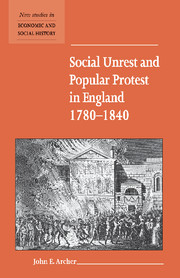Book contents
3 - Food riots
Published online by Cambridge University Press: 05 July 2015
Summary
Food riots were the most common and widespread forms of popular collective action during the eighteenth century, accounting for two of every three disturbances. Major outbreaks occurred in 1709–10, 1727–9, 1739–40, 1756–7, 1766–8, 1772–3, 1783–4, 1794–6, 1800–1, 1810–13 and 1816–18, declining rapidly thereafter – the Celtic fringe excepted – to be replaced by other forms of protest. Historians have probably subjected this form of consumer protest to greater and closer analysis than any other form of popular protest and, as a result, the seemingly straightforward food riot has become an event of enormous complexity and variety. The so-called economic reductionist equation of high corn prices equalling a food riot offers only a partial explanation for the timing and occurrence of such events. Furthermore, many food riots were not solely concerned with the price of grain but were frequently related to issues of supply, of grain being exported out of a region during periods of scarcity and of farmers hoarding grain in order to create artificial shortages. The food riot could therefore be directed against a variety of people, from farmers to middlemen and millers, to shopkeepers and grocers, and could take on many forms. The objective was, however, always the same, to ensure a greater supply of food for the community. This was achieved more often than not through threats of violence, rather than actual physical violence to persons, through food seizures, and through appeals to local authorities, who – it must be said – frequently sided with the crowd for a variety of reasons, fear not necessarily being the prevailing motive. The many layers of the food riot have been progressively stripped down and examined. In the process, E. P. Thompson's thesis of the ‘moral economy’ (1971) has proved enormously influential to our understanding not only of the food riot, but also of other forms of popular action.
- Type
- Chapter
- Information
- Social Unrest and Popular Protest in England, 1780–1840 , pp. 28 - 41Publisher: Cambridge University PressPrint publication year: 2000
- 1
- Cited by

